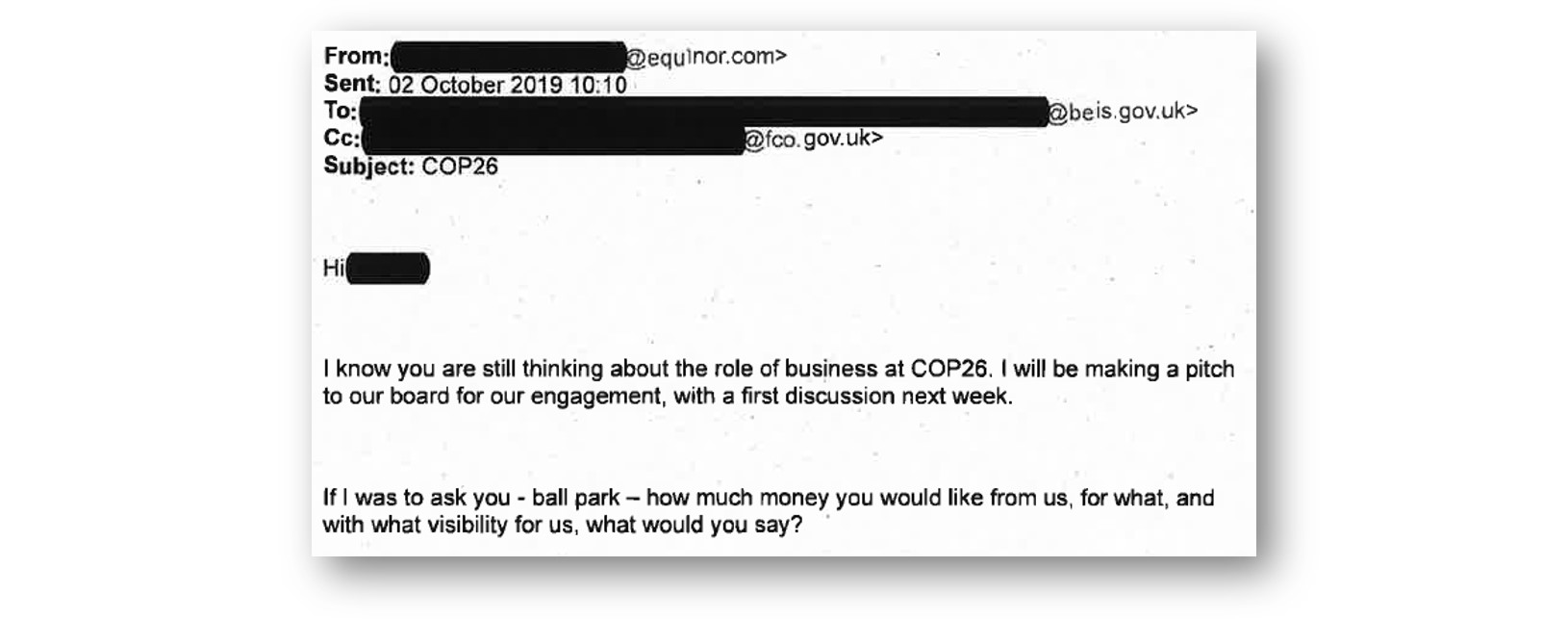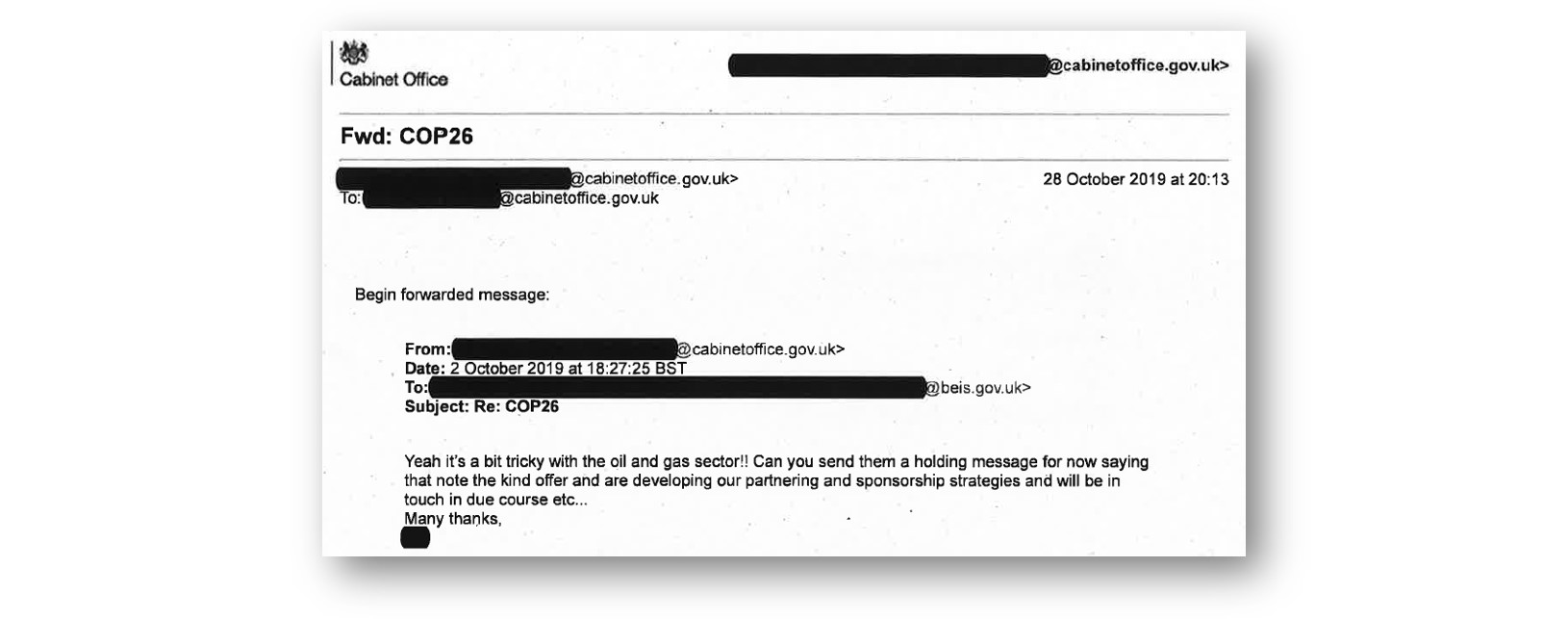Oil company Equinor suggested to government officials that it could invest in the UK’s natural carbon sinks in an apparent effort to secure its presence at the next UN climate talks, to be held in Glasgow in November 2021, internal memos show.
Campaigners said the exchange showed how oil companies continue to push “false solutions” to climate change to greenwash their images and garner favour with governments.
Dozens of emails and notes obtained by campaign organisation Culture Unstained reveal how Equinor, Shell and BP set up informal lunches and meetings with civil servants and government ministers including Andrea leadsom, Kwasi Karteng and Alok Sharma to discuss their place at the climate talks, known as COP26.
In August, the government appeared to raise the bar for its COP26 sponsors, requesting candidates who are “making real contributions to the fights against climate change”, have “strong climate credentials”, and “set ambitious net zero commitments by 2050 or earlier”.
While this was interpreted as ruling out fossil fuel companies, the COP26 Unit confirmed to DeSmog that it has not eliminated any specific industries or businesses from the selection process, and that an announcement about sponsors will be made in due course.
Like what you’re reading? Support DeSmog by becoming a patron today!
Oil sponsorship
The documents, dating between July 2019 to May this year, show the oil majors have consistently been vying for government attention through a steady stream of correspondence.
Referring to the Equinor’s role at COP26, one email from a company employee to the Department for Business, Energy & Industrial Strategy (BEIS) in October 2019 asks outright: “If I was to ask you – ball park – how much money you would like from us, for what, and with what visibility for us, what would you say?”
The request was greeted by a degree of confusion by civil servants, with one remarking to a colleague: “Yeah, it’s a bit tricky with the oil and gas sector!! Can you send them a holding message for now saying that [we] note the kind offer and [we] are developing our sponsorship and partnering strategies”.
Emails show Equinor followed up with a meeting with a member of the government’s COP Unit and was “chasing up on offers made (by Equinor) to help in the preparations for COP26, including possibly through sponsorship”.
In March, as COVID-19 restrictions loomed in the UK, Equinor pushed for an in-person meeting with the Cabinet Office the very next day, citing a meeting in October when they had “agreed we would be happy to be one of the proactively helpful energy companies”.
Nature-based influence
The March meeting never materialised due to lockdown, but Equinor continued to press for an audience with the government. Company representatives chased civil servants for a longer meeting in May, in which they wanted to cover “campaigns, energy industry policies, deliverables and ‘announceables’, international engagement and natural climate solutions.”
Unlike a growing number of energy companies, Equinor has not yet pledged to reach net-zero emissions by 2050, instead saying it will reduce its net emissions intensity by 50 percent by 2050. This distinction allows for the continued extraction of oil and gas, which the company said it would continue to produce for the “foreseeable future”.
Alongside investment in renewables, Equinor plans to use ‘nature-based solutions’, such as planting trees, to decarbonise its energy supply — though this is yet to materialise in practice. Since November 2018, the company has said it will invest in Emergent, a mechanism to process carbon credits made through tropical forestry protection, as soon as that is viable.
This commitment to NBS is reinforced in the company’s ‘climate roadmap’. Launched in February 2020, it says: “natural climate solutions, particularly protection of tropical rainforests and other land-based solutions, can contribute up to one-third of the climate efforts the world needs over the next decades.”
Read more — Investigation: The Problem with Big Oil’s ‘Forest Fever’
At the May meeting, the company said it was “open to wider conversations with HMG [Her Majesty’s Government] and projects in the UK (e.g. the restoration of peat bogs in Scotland)” and made plans for a follow-up conversation on the subject.
An Equinor spokesman confirmed these plans to DeSmog, adding that as the developer of the world’s biggest offshore wind farm, Dogger Bank in the UK, and as the leader of the Zero Carbon Humber project, it was proud to be “supporting the UK’s energy transition and net zero goals”.
It seems Equinor was right to try and use NBS as a make-weight in its attempts to get its foot in the door with the UK government.
For the meeting with Equinor, BEIS officials allotted an entire section to carbon markets and nature-based solutions. Their own notes for the meeting read: “Strengthening robust carbon markets which unlock private finance for mitigation, including through nature-based solutions, is an important part of COP26.”
They added that it was “engaging key countries and partners to explore how we can support a package of initiatives which strengthen high-integrity carbon markets and support the global transition to net-zero, including through unlocking additional finance for Nature-Based Solutions”.
DeSmog has contacted BEIS for comment.
‘Not the only answer’
Nature-based solutions have been widely acknowledged by governments and big business as playing a vital role in cutting emissions through restoring or preserving natural carbon sinks to reach Paris Agreement targets of a 1.5C warming by the end of the century.
But campaigners are concerned that the effectiveness and viability is frequently overstated, potentially leading to dubious carbon reductions and harm to the Indigenous populations and rich biodiversity home to the impacted forests.
In particular, they argue that Big Oil companies’ recent interest in nature-based solutions is designed to improve their image while they continue to invest heavily in oil and gas.
When asked in the meeting about reducing its Scope 3 emissions, which include emissions from the burning of its products and make up the bulk of the company’s carbon footprint, Equinor answered: “Moving the company’s focus [away] from oil and gas is not the only answer”.
The exchanges show Equinor is minimising the importance of decarbonising, while at the same time overplaying the carbon benefits of natural climate solutions to convince BEIS they were worthy sponsors, Culture Unstained’s Chris Garrard says.
“These documents reveal that oil and gas companies still have a backchannel to the organisers of COP and are once again pushing false solutions. If we’re to keep the world below 1.5C, we need to see rapid cuts in fossil fuel production and an end to new exploration,” he told DeSmog.
“Instead, companies like Equinor cynically argue that moving their focus ‘away from oil and gas is not the only answer’ as they desperately overstate the potential role of offsets and nature based solutions. The COP Unit must now rule out partnerships with fossil fuel companies — it should be Indigenous communities and those already being impacted by climate change setting out the solutions, not the architects of the climate crisis.”
Mel Evans, senior climate campaigner for Greenpeace UK, agreed the government’s criteria “should rule out any fossil fuel companies which by definition have caused the very crisis that the talks seek to address”.
Evans added: “The only discussion the UK government should be having with the oil industry right now is about the carefully managed wind down of North Sea oil and gas production and a just transition for the workers and communities who currently depend on it.”
“The government would be a global embarrassment if it were to line up fossil fuel companies to sponsor a conference designed to address the destruction those very companies are causing.”
Image: Carina Johansen/Scanpix CC BY–NC 4.0
Subscribe to our newsletter
Stay up to date with DeSmog news and alerts










